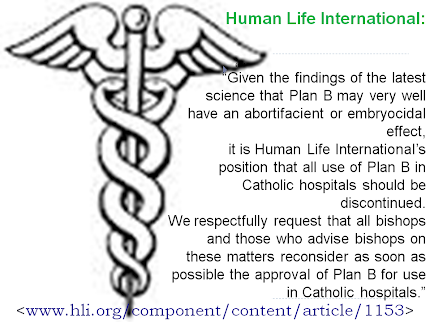An unattributed item on your web site rightly indicates that there is no substantial difference in the positions of the German bishops and the American bishops, with regard to treatment of individuals identifying themselves as victims of sexual assault:
"Recently the secular media
again has insisted that there is a disparity among the teachings of the
Catholic Bishops. They cite the recent statements by German bishops
concerning sexual assault protocols in Catholic hospitals. However, on a
closer examination, it is clear that their position is consistent with
the Ethical and Religious Directives for Catholic Health Care
Services (ERDs), as promulgated by the U.S. Conference of Catholic
Bishops....
"With
appropriate testing, as indicated by the ERDs, emergency contraception
may be provided to sexually assaulted women, and should be [emphasis added].
Manufacturers of emergency contraception indicate that it has three
potential functions: to prevent ovulation, so that fertilization cannot
occur; to alter the woman’s cervical mucus to slow the speed of the
sperm reaching the egg (ovum); and to alter the uterine lining to
prevent the embryo from implanting and receiving the nourishment it
needs to survive....
"Credible
research tells us that altering sperm mobility and its capacity to
fertilize the egg cannot occur quickly enough when these hormones are
taken for emergency contraception.[7] Sperm can be at the point of
fertilization in a woman in five minutes.[8] Thus, the only function of
emergency contraception that does not involve the destruction of the
newly conceived human being, that can occur quickly enough, is the
prevention of ovulation....
"There is no test to determine
if conception has occurred until up to 16 days after the embryo has
been conceived. However, there is a simple test to determine if the
emergency contraception can be given at a time that may prevent
ovulation....Thus,
Catholic hospitals can use this test as part of a sexual assault
protocol to determine if pregnancy can be prevented. The test is
usually positive only for one day, and the egg usually only lives for
one day, so there is a very limited period of time in which the
emergency contraception should not be administered in order to prevent
its potential abortifacient effect (prevention of implantation, which
manufacturers indicate is a potential action)....
"In all such
cases, the patient is provided with all the information she needs for
informed consent as to why such testing should be done, and all of the
manufacture’s stated potential actions of the emergency contraction.
This is just good medicine. And if the patient, after being stabilized
and provided all of the excellent care available to her at our Catholic
hospitals, wishes to be transferred safely to another provider of her
choice, the transfer of care is safely provided for her....The
position of the German and American bishops constitutes compassionate
and pastoral care of the victim of sexual assault who has the right to
protect herself from the unjust aggressor, by preventing conception, as
it is accurately defined. Both statements clearly indicate that
anything that is used to cause the death of the embryo after conception
is inconsistent with respect for human life. Thus, both the positions of
the American bishops and that of the German bishops are totally
consistent and do not represent any new teaching of the Catholic Church" ("There is No Inconsistency: German and American Bishops’ Treatment of Sexual Assault Victims," NCBC, 3/13/13).
Dr. Haas, I suspect that many faithful Catholics are missing much of what is being said and much of what is NOT being said in the above. For example,
- Many are unaware that there is no comparable guidance from the Vatican, outlining situations for supposedly moral use of EC (In fact, documents such as the Statement on the So-Called "Morning After Pill" and Dignitas Personae indicate NO morally acceptable use of EC.);
- The above protocol makes no guarantee that the use of EC will not be abortifacient;
- The scientific assumptions are questionable.
With all respect, I assume that the above was not written by a physician, as there are no physicians on your staff. I am confident that you are aware of the recent writing of Fr.
Juan Vélez, who is an Opus Dei priest with
a doctorate in dogmatic theology and an M.D. Along with Rebecca Peck, M.D., Fr. Juan writes:
"All physicians who value life, and especially Catholic healthcare
institutions, have a duty to re-examine the available scientific
information on Plan B. We think the data shows a small anovulatory
effect and suggests a significant post-fertilization or abortifacient
effect. Given this information, the Peoria Protocol, and other
rape-based protocols should be abandoned, as use of Plan B during the
critical fertile period, would not be expected to prevent
ovulations in a majority of cases, and in fact, would lead to a
significant possibility of post-fertilization effect.
In the words of
Human Life International, I pray "that Catholic bishops and those who advise them in these
issues will see the urgency of revisiting the approval of Plan B for
treatment of women who have been raped. These women deserve the
absolute best life-affirming care possible, and this care should not
include drugs that only compound the violence already suffered by
causing abortions."
May victims of rape be administered a “Plan B” (levonorgestrel-only) contraceptive?
Catholic bishops, ethicists, and researchers have given a variety
of answers to this question. Some forbid its use entirely, others
permit it only after certain tests are done, still others allow it
every time a victim of rape seeks care. This disparity in policy is
primarily a result of the status of the science that continues to
explore how this drug works. Recently a furor over the announcement by
the German bishops that Plan B was approved for use at Catholic
hospitals seemed to end with widespread confusion and a deepening of
divisions between those who disagree on the issue. We believe that
such a resolution on so important a question is completely
unsatisfactory.
Given the findings of the latest science that Plan B may very well
have an abortifacient or embryocidal effect, it is Human Life
International’s position that all use of Plan B in Catholic hospitals
should be discontinued. We respectfully request that all bishops and
those who advise bishops on these matters reconsider as soon as
possible the approval of Plan B for use in Catholic hospitals.

The Church’s moral teaching regarding this matter is summarized by the Bishops of the United States in the
Ethical and Religious Directives for Catholic Health Care Services:
A female who has been raped should be able to defend
herself against a potential conception from the sexual assault…It is
not permissible, however, to initiate or to recommend treatments that
have as their purpose or direct effect the removal, destruction, or
interference with the implantation of a fertilized ovum. (36)
With this moral principle in place, the question then becomes,
Does Plan B cause early abortions? We set out to explore this through a series of articles published on our
Truth and Charity Forum (part 1, part 2, part 3, part 4, part 5, part 6).
By publishing some of the strongest authors on the subject, all of
whom approach the relevant science through the lens of orthodox
Catholic moral theology, we wanted to provide a resource for bishops,
and for those who advise bishops on the question of Plan B. Having
researched the question and completed the series, HLI makes the
following conclusions:
1. Recent large and robust studies indicate
that Levonorgestrel-only contraceptives such as Plan B rarely block
ovulation, and most likely do result in the death of the embryo if
administered during the first 4-5 days of the fertile window.*
2. A Luteinizing Hormone (LH) protocol – a test whose
outcome has been understood to determine whether a drug can be
administered based on where the victim is in her cycle – cannot in
fact detect that a woman is in these first days of her fertile window.
Therefore a negative LH test may well encourage administration of
Plan B precisely when it is most likely to cause an early direct
abortion.**
3. Because recent scientific studies have provided very strong
data that indicates Plan B rarely has any contraceptive effects and is
likely to have embryocidal effects, a medical practitioner cannot
attain moral certainty that administration will not lead to early
abortion.
4. Since one cannot attain
moral certainty that abortion will be avoided, protocols and policies
that currently permit Catholic health care providers to administer
Plan B need to be reconsidered by the appropriate diocesan authorities
and hospital administrators. Nations in which abortion is illegal
should be aware of this potential abortion-inducing effect and should
prohibit the administration of these drugs.
These are our conclusions pending any developments in scientific
research. Further, it appears that no contraceptive exists that is known
to meet the reasonable criteria expressed by the Church above.
The urgency of addressing this matter comes to light when one
considers the Church’s teaching regarding abortion expressed most
recently in
Dignitas personae:
It must be noted, however, that anyone who seeks to
prevent the implantation of an embryo which may possibly have been
conceived, and who therefore either requests or prescribes such a
pharmaceutical, generally intends abortion. … Therefore the use of
means of interception…fall within the sin of abortion and are gravely
immoral. (23)
Here we have considered the use of a contraceptive following the
unjust act of rape. We must, however, also reaffirm the Church’s
unchanged and unchangeable doctrine on both abortion and the
contraception of the marital act – both remain morally illicit without
exception. As Pope Paul VI wrote in
Humanae vitae, “it is necessary that each and every marriage act remain ordered per se to the procreation of human life.” (11)
We hope that Catholic bishops and those who advise them in these
issues will see the urgency of revisiting the approval of Plan B for
treatment of women who have been raped. These women deserve the
absolute best life-affirming care possible, and this care should not
include drugs that only compound the violence already suffered by
causing abortions.
Further, we ask those concerned both for women who suffer rape and
for nascent human life to approach bishops on these questions with
respect, and pray for our shepherds that these and all answers to
questions about human life and dignity may express, in the words of
Dignitas personae, “a great ‘yes’ to human life.”
__________________
* There is a distinction in the scientific community between an
abortifacient effect, which disrupts a pregnancy after implantation, and
an embryocidal effect, which is “interceptive” or prevents
implantation. Plan B appears to have the latter, embryocidal, effect.
Since a human life is destroyed in either case, the distinction is not
moral but technical, so we have stayed with the common language term
and note here the difference.
** Previous scientific statements on Plan B’s mechanism of action
declared Plan B to work mainly by preventing ovulation. Recent
scientific evidence suggests, however, that Plan B does not work by
preventing ovulation. Moreover, recent scientific evidence also shows
that Plan B has no effect on cervical mucus or sperm function.
Finally, as suggested in Point 1, recent evidence suggests that due to
shortening of the luteal phase and other indicators, Plan B may
likely prevent the new embryo from implanting into the uterine wall,
resulting in an embryocidal effect.
- See more at: http://www.hliworldwatch.org/?p=2464#sthash.H8dPXw9K.dpuf
May victims of rape be administered a “Plan B” (levonorgestrel-only) contraceptive?
Catholic bishops, ethicists, and researchers have given a variety
of answers to this question. Some forbid its use entirely, others
permit it only after certain tests are done, still others allow it
every time a victim of rape seeks care. This disparity in policy is
primarily a result of the status of the science that continues to
explore how this drug works. Recently a furor over the announcement by
the German bishops that Plan B was approved for use at Catholic
hospitals seemed to end with widespread confusion and a deepening of
divisions between those who disagree on the issue. We believe that
such a resolution on so important a question is completely
unsatisfactory.
Given the findings of the latest science that Plan B may very well
have an abortifacient or embryocidal effect, it is Human Life
International’s position that all use of Plan B in Catholic hospitals
should be discontinued. We respectfully request that all bishops and
those who advise bishops on these matters reconsider as soon as
possible the approval of Plan B for use in Catholic hospitals.

The Church’s moral teaching regarding this matter is summarized by the Bishops of the United States in the
Ethical and Religious Directives for Catholic Health Care Services:
A female who has been raped should be able to defend
herself against a potential conception from the sexual assault…It is
not permissible, however, to initiate or to recommend treatments that
have as their purpose or direct effect the removal, destruction, or
interference with the implantation of a fertilized ovum. (36)
With this moral principle in place, the question then becomes,
Does Plan B cause early abortions? We set out to explore this through a series of articles published on our
Truth and Charity Forum (part 1, part 2, part 3, part 4, part 5, part 6).
By publishing some of the strongest authors on the subject, all of
whom approach the relevant science through the lens of orthodox
Catholic moral theology, we wanted to provide a resource for bishops,
and for those who advise bishops on the question of Plan B. Having
researched the question and completed the series, HLI makes the
following conclusions:
1. Recent large and robust studies indicate
that Levonorgestrel-only contraceptives such as Plan B rarely block
ovulation, and most likely do result in the death of the embryo if
administered during the first 4-5 days of the fertile window.*
2. A Luteinizing Hormone (LH) protocol – a test whose
outcome has been understood to determine whether a drug can be
administered based on where the victim is in her cycle – cannot in
fact detect that a woman is in these first days of her fertile window.
Therefore a negative LH test may well encourage administration of
Plan B precisely when it is most likely to cause an early direct
abortion.**
3. Because recent scientific studies have provided very strong
data that indicates Plan B rarely has any contraceptive effects and is
likely to have embryocidal effects, a medical practitioner cannot
attain moral certainty that administration will not lead to early
abortion.
4. Since one cannot attain
moral certainty that abortion will be avoided, protocols and policies
that currently permit Catholic health care providers to administer
Plan B need to be reconsidered by the appropriate diocesan authorities
and hospital administrators. Nations in which abortion is illegal
should be aware of this potential abortion-inducing effect and should
prohibit the administration of these drugs.
These are our conclusions pending any developments in scientific
research. Further, it appears that no contraceptive exists that is known
to meet the reasonable criteria expressed by the Church above.
The urgency of addressing this matter comes to light when one
considers the Church’s teaching regarding abortion expressed most
recently in
Dignitas personae:
It must be noted, however, that anyone who seeks to
prevent the implantation of an embryo which may possibly have been
conceived, and who therefore either requests or prescribes such a
pharmaceutical, generally intends abortion. … Therefore the use of
means of interception…fall within the sin of abortion and are gravely
immoral. (23)
Here we have considered the use of a contraceptive following the
unjust act of rape. We must, however, also reaffirm the Church’s
unchanged and unchangeable doctrine on both abortion and the
contraception of the marital act – both remain morally illicit without
exception. As Pope Paul VI wrote in
Humanae vitae, “it is necessary that each and every marriage act remain ordered per se to the procreation of human life.” (11)
We hope that Catholic bishops and those who advise them in these
issues will see the urgency of revisiting the approval of Plan B for
treatment of women who have been raped. These women deserve the
absolute best life-affirming care possible, and this care should not
include drugs that only compound the violence already suffered by
causing abortions.
Further, we ask those concerned both for women who suffer rape and
for nascent human life to approach bishops on these questions with
respect, and pray for our shepherds that these and all answers to
questions about human life and dignity may express, in the words of
Dignitas personae, “a great ‘yes’ to human life.”
__________________
* There is a distinction in the scientific community between an
abortifacient effect, which disrupts a pregnancy after implantation, and
an embryocidal effect, which is “interceptive” or prevents
implantation. Plan B appears to have the latter, embryocidal, effect.
Since a human life is destroyed in either case, the distinction is not
moral but technical, so we have stayed with the common language term
and note here the difference.
** Previous scientific statements on Plan B’s mechanism of action
declared Plan B to work mainly by preventing ovulation. Recent
scientific evidence suggests, however, that Plan B does not work by
preventing ovulation. Moreover, recent scientific evidence also shows
that Plan B has no effect on cervical mucus or sperm function.
Finally, as suggested in Point 1, recent evidence suggests that due to
shortening of the luteal phase and other indicators, Plan B may
likely prevent the new embryo from implanting into the uterine wall,
resulting in an embryocidal effect.
- See more at: http://www.hliworldwatch.org/?p=2464#sthash.H8dPXw9K.dpuf

















 The Church’s moral teaching regarding this matter is summarized by the Bishops of the United States in the Ethical and Religious Directives for Catholic Health Care Services:
The Church’s moral teaching regarding this matter is summarized by the Bishops of the United States in the Ethical and Religious Directives for Catholic Health Care Services:






